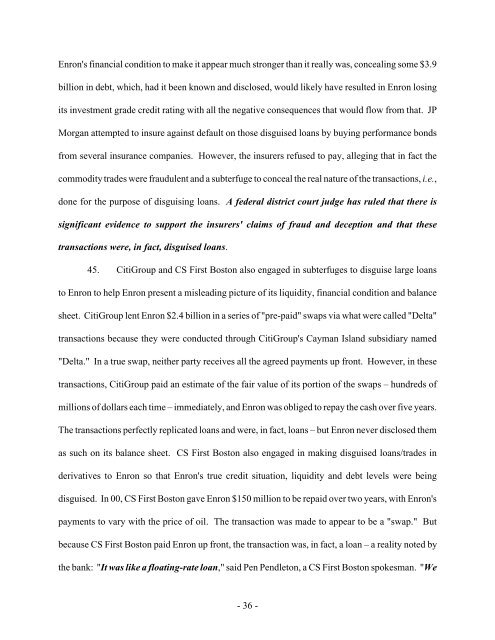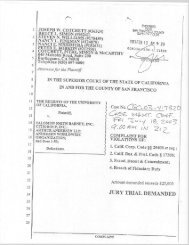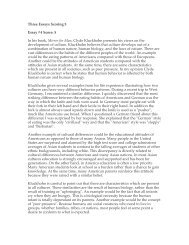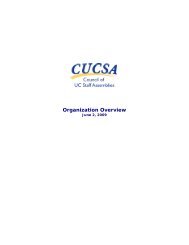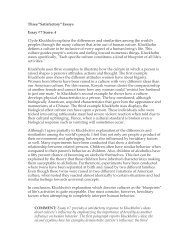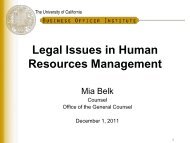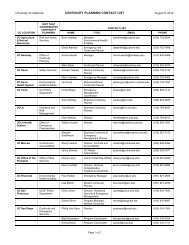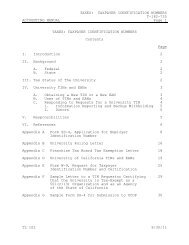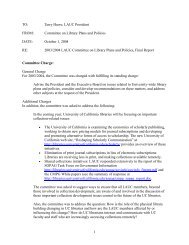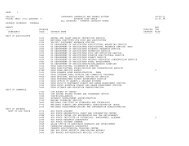- Page 2 and 3: KEN L. HARRISON, STEVEN J. KEAN, RE
- Page 4 and 5: TABLE OF CONTENTS - i - Page PREAMB
- Page 6 and 7: ... hiding losses/SEC violations)..
- Page 8 and 9: 2 Certain defendants named herein,
- Page 10 and 11: to do so would incriminate them. Wh
- Page 12 and 13: y Enron to keep high-debt assets li
- Page 14 and 15: in JEDI, making it possible for tra
- Page 16 and 17: continued to accelerate, ultimately
- Page 18 and 19: financial condition and investment
- Page 20 and 21: it controlled, and was doing phony
- Page 22 and 23: Bobcat Raptor-IV Marlin Trust I Mar
- Page 24 and 25: to be utilized to engage in transac
- Page 26 and 27: facilitate and finance LJM2's illic
- Page 28 and 29: unnoticed: 30. This blatant self-de
- Page 30 and 31: LJM1 and LJM2 in transactions struc
- Page 32 and 33: and more of the stock issuance "tri
- Page 34 and 35: dollar contracts which allowed it t
- Page 36 and 37: 41. Just eight months after announc
- Page 38 and 39: Dollars Per Share 30 25 20 15 10 5
- Page 42 and 43: Enron's finances, but very likely w
- Page 44 and 45: Merrill Lynch CitiGroup Banks Named
- Page 46 and 47: CitiGroup Barclays Banks Named As D
- Page 48 and 49: The employee adds that anyone who q
- Page 50 and 51: of the SPEs Enron did business with
- Page 52 and 53: destroying millions of pages of doc
- Page 54 and 55: - Statement of Financial Accounting
- Page 56 and 57: eporting earnings from the 3rdQ 00
- Page 58 and 59: disclosures were crafted and approv
- Page 60 and 61: falsify its financial results and t
- Page 62 and 63: 72. On 2/26/02, Dow Jones News Serv
- Page 64 and 65: Dollars Per Share 100 90 80 70 60 5
- Page 66 and 67: A. Lead Plaintiff PARTIES 79. Court
- Page 68 and 69: (g) Plaintiff Amalgamated Bank, as
- Page 70 and 71: D. Defendants and Related Parties (
- Page 72 and 73: Enron Corp. Defendant J. Skilling's
- Page 74 and 75: Dollars per Share Enron Corp. Defen
- Page 76 and 77: Enron Corp. Defendant S. Horton's Q
- Page 78 and 79: Dollars per Share Enron Corp. Defen
- Page 80 and 81: Dollars per Share Enron Corp. Defen
- Page 82 and 83: Dollars per Share Enron Corp. Defen
- Page 84 and 85: Dollars per Share Enron Corp. Defen
- Page 86 and 87: Ms. Olson [told] employees in Decem
- Page 88 and 89: Dollars per Share Enron Corp. Defen
- Page 90 and 91:
Dollars per Share Enron Corp. Defen
- Page 92 and 93:
Dollars per Share Enron Corp. Defen
- Page 94 and 95:
Dollars per Share Enron Corp. Defen
- Page 96 and 97:
Dollars per Share Enron Corp. Defen
- Page 98 and 99:
Dollars per Share Enron Corp. Defen
- Page 100 and 101:
(dd) Defendants John Mendelsohn ("M
- Page 102 and 103:
(ii) The Marlin Water and Atlantic
- Page 104 and 105:
public information, pocketing over
- Page 106 and 107:
Dollars per Share $100 $80 $60 $40
- Page 108 and 109:
As of 3/98 Executive Committee Comp
- Page 110 and 111:
Steven J. KeanSenior Vice President
- Page 112 and 113:
Kevin P. Hannon Chief Operating Off
- Page 114 and 115:
shortly after their issuance and/or
- Page 116 and 117:
(b) Defendant Thomas H. Bauer ("Bau
- Page 118 and 119:
(l) Defendant Richard R. Petersen (
- Page 120 and 121:
(4) Investment Banks 99.1 Each of t
- Page 122 and 123:
Notes due 7/15/06 and 6.95% Notes d
- Page 124 and 125:
devised, implemented and financed (
- Page 126 and 127:
6.19% Senior Secured Notes due 03;
- Page 128 and 129:
of and controlled by Bank of Americ
- Page 130 and 131:
fraudulent scheme by disguising deb
- Page 132 and 133:
fraudulent scheme by repeatedly iss
- Page 134 and 135:
BACKGROUND TO THE CLASS PERIOD 109.
- Page 136 and 137:
"Enron's water subsidiary initially
- Page 138 and 139:
• Enron just had a great, great q
- Page 140 and 141:
loans to the SPEs and Barclays had
- Page 142 and 143:
without any adequate feasibility st
- Page 144 and 145:
Registration Statement was signed b
- Page 146 and 147:
• Wholesale Energy Operations and
- Page 148 and 149:
... Together, our business units re
- Page 150 and 151:
10-K report. The Form 10-K containe
- Page 152 and 153:
performance and all of the indicati
- Page 154 and 155:
150. On 5/7/99, Lehman Brothers iss
- Page 156 and 157:
Communications Is Running Faster an
- Page 158 and 159:
costs. For example, Enron picked th
- Page 160 and 161:
(k) Under Mark-Jusbasche, Enron Int
- Page 162 and 163:
(p) As a result of the foregoing, t
- Page 164 and 165:
160. On 7/14/99, The Houston Chroni
- Page 166 and 167:
In discussing the most recent decli
- Page 168 and 169:
• Enron expects this sector ... t
- Page 170 and 171:
178. On 10/12/99, Bloomberg reporte
- Page 172 and 173:
three times the $850 million contra
- Page 174 and 175:
Enron Corp. had a 12.5% increase in
- Page 176 and 177:
months there was speculation of a c
- Page 178 and 179:
* * * ECI has two new and related b
- Page 180 and 181:
198. On 1/18/00, CS First Boston is
- Page 182 and 183:
• This is a huge step forward for
- Page 184 and 185:
208. On 1/21/00, Merrill Lynch issu
- Page 186 and 187:
The company hopes to capture 10 per
- Page 188 and 189:
of mark-to-market accounting by ado
- Page 190 and 191:
(ii) EES entered into demand-side-m
- Page 192 and 193:
(j) To inflate the purported revenu
- Page 194 and 195:
(q) As a result of the foregoing, t
- Page 196 and 197:
Andersen: 218. With respect to EES,
- Page 198 and 199:
Fastow also appeared at the Enron A
- Page 200 and 201:
227. On 4/12/00, CitiGroup issued a
- Page 202 and 203:
communications segment. The wholesa
- Page 204 and 205:
TRADING GROWING FASTER THAN EXPECTE
- Page 206 and 207:
Enron and Blockbuster plan to intro
- Page 208 and 209:
244. On 7/19/00, CitiGroup issued a
- Page 210 and 211:
• The bandwidth trading component
- Page 212 and 213:
Broadband Services In our view, Enr
- Page 214 and 215:
• ENE reported 2Q00 EPS of $0.34,
- Page 216 and 217:
• ... Enron Broadband Services ..
- Page 218 and 219:
• In terms of content, Enron Broa
- Page 220 and 221:
It also had over 10 additional tran
- Page 222 and 223:
• Impressive wholesale energy res
- Page 224 and 225:
271. As a result of defendants' fal
- Page 226 and 227:
let alone continue to engage in sim
- Page 228 and 229:
Retail Energy Services: ... Enron E
- Page 230 and 231:
Well, we were up, 1998, we were up,
- Page 232 and 233:
• Growth Targets Lifted .... * *
- Page 234 and 235:
acceleration of growth and creation
- Page 236 and 237:
Our talented people ... financial s
- Page 238 and 239:
stock, selling 1.1 million shares i
- Page 240 and 241:
evenue. Even though Enron could not
- Page 242 and 243:
ecognized a multi-million dollar pr
- Page 244 and 245:
exchange for orders by Enron in 99
- Page 246 and 247:
streaming content because the EIN a
- Page 248 and 249:
not have the legal right to electro
- Page 250 and 251:
illions of dollars while concealing
- Page 252 and 253:
4 years .... We are projecting mini
- Page 254 and 255:
308. On 3/22/01, CitiGroup issued a
- Page 256 and 257:
and Content Delivery which remain s
- Page 258 and 259:
• a 281 percent increase in reven
- Page 260 and 261:
[W]e ... said to investors, as long
- Page 262 and 263:
growth in '98, 18% growth in '99 an
- Page 264 and 265:
326. On 5/18/01, CitiGroup issued a
- Page 266 and 267:
conference calls and in follow-up c
- Page 268 and 269:
stated: 332. On 7/12/01, Skilling a
- Page 270 and 271:
337. On 7/25/01, Bloomberg News rep
- Page 272 and 273:
financial condition and liquidity -
- Page 274 and 275:
equipment, a significant portion of
- Page 276 and 277:
million up-front cash just to sign
- Page 278 and 279:
(i) Enron entered into dark-fiber s
- Page 280 and 281:
intermediation. Even worse, Enron g
- Page 282 and 283:
sense, to "just drink more Enron Ko
- Page 284 and 285:
Dear Mr. Lay, * * * Skilling's abru
- Page 286 and 287:
. Cliff Baxter complained mightily
- Page 288 and 289:
is up 40%, earnings per share up ab
- Page 290 and 291:
CEO Jeff Skilling Resigns; A Negati
- Page 292 and 293:
356. On 8/28/01, Lay was interviewe
- Page 294 and 295:
... But all of the problems I have
- Page 296 and 297:
362. On 10/9/01, Merrill Lynch issu
- Page 298 and 299:
- $180 million associated with the
- Page 300 and 301:
income, to about $400 million and a
- Page 302 and 303:
Enron Corporation (BUY) Third Quart
- Page 304 and 305:
of things - the LJM transactions we
- Page 306 and 307:
Enron Continues As Market-Maker of
- Page 308 and 309:
failing to eliminate additional hun
- Page 310 and 311:
391. Rubin's and Harrison's effort
- Page 312 and 313:
DEFENDANTS' SCHEME AND FRAUDULENT C
- Page 314 and 315:
Enron Defendants had permitted Enro
- Page 316 and 317:
Derrick 230,660 $ 12,563,928 John D
- Page 318 and 319:
Dollars per Share $100 $80 $60 $40
- Page 320 and 321:
executives will be generally hesita
- Page 322 and 323:
and 99.9%. This level of certainty
- Page 324 and 325:
ENRON'S FALSE FINANCIAL STATEMENTS
- Page 326 and 327:
$12,000,000,000 $10,000,000,000 $8,
- Page 328 and 329:
50.00% 45.00% 40.00% 35.00% 30.00%
- Page 330 and 331:
8 Debt to equity is calculated usin
- Page 332 and 333:
executed in accordance with managem
- Page 334 and 335:
SPEs, under any accounting machinat
- Page 336 and 337:
439. However, even after employing
- Page 338 and 339:
(a) Enron Guarantee Fee 443. Enron
- Page 340 and 341:
(2) LJM Partnerships 448. Enron als
- Page 342 and 343:
comparable securities in the market
- Page 344 and 345:
CS First Boston, Merrill Lynch, JP
- Page 346 and 347:
hedged through traditional transact
- Page 348 and 349:
gathering system in the Gulf of Mex
- Page 350 and 351:
(b) Raptors (i) Raptor I 477. The f
- Page 352 and 353:
only entered to avoid recognition o
- Page 354 and 355:
million, giving LJM2 its specified
- Page 356 and 357:
y a total of $1 billion in the unau
- Page 358 and 359:
Skilling, knew of the decline, by w
- Page 360 and 361:
(2) the transferred assets were not
- Page 362 and 363:
S-K required the disclosure of the
- Page 364 and 365:
Even though a misstatement of an in
- Page 366 and 367:
522. In order for Enron to accrue r
- Page 368 and 369:
engaged in swapping capacity of thi
- Page 370 and 371:
earnings and separately disclosed i
- Page 372 and 373:
practice was common in all trading
- Page 374 and 375:
What made it all work, Dickson said
- Page 376 and 377:
14 Securities that are bought and h
- Page 378 and 379:
(4) Quaker Oats 557. Under one of i
- Page 380 and 381:
supplied by Enron under the terms o
- Page 382 and 383:
(2) Prepaid Swaps with CitiGroup an
- Page 384 and 385:
In essence, his report concluded, E
- Page 386 and 387:
Project Name Description Contract V
- Page 388 and 389:
earnings below expectations. By 97,
- Page 390 and 391:
content services business. In fact,
- Page 392 and 393:
593. Enron also failed to disclose
- Page 394 and 395:
Enron arrived in India in the early
- Page 396 and 397:
holdings for $700 million. It is no
- Page 398 and 399:
investment and credit decisions ref
- Page 400 and 401:
Date of Offering Effective Date of
- Page 402 and 403:
created in Enron, the Offering Docu
- Page 404 and 405:
621. The true effect of "early sett
- Page 406 and 407:
FINANCIAL RISK MANAGEMENT * * * Enr
- Page 408 and 409:
Vinson & Elkins also knew because t
- Page 410 and 411:
could connect. Enron's BOS was to b
- Page 412 and 413:
not even make a broadband connectio
- Page 414 and 415:
05/17/01 Enron Euro Credit Linked N
- Page 416 and 417:
usiness is the management of certai
- Page 418 and 419:
Yosemite Securities Trust I Offerin
- Page 420 and 421:
Communications Enron is developing
- Page 422 and 423:
(a) Annual Report on Form 10-K for
- Page 424 and 425:
ENRON HISTORICAL CONSOLIDATED FINAN
- Page 426 and 427:
Business of Enron DESCRIPTION OF EN
- Page 428 and 429:
Income Statement Data: SELECTED HIS
- Page 430 and 431:
• the transportation of natural g
- Page 432 and 433:
Balance Sheet Data (at end of perio
- Page 434 and 435:
wholesale customers to view Enron's
- Page 436 and 437:
ENRON HISTORICAL CONSOLIDATED FINAN
- Page 438 and 439:
Marlin Water Trust II/Marlin Water
- Page 440 and 441:
Retail Energy Services Enron Energy
- Page 442 and 443:
Cumulative effect of accounting cha
- Page 444 and 445:
A. General INVOLVEMENT OF THE BANKS
- Page 446 and 447:
manage such conflicts of interests.
- Page 448 and 449:
privately held entity created by En
- Page 450 and 451:
caused its stock to plunge and impa
- Page 452 and 453:
its financial results. Thus, the ba
- Page 454 and 455:
something each of the banks named a
- Page 456 and 457:
7/01 Marlin Water Trust II, Marlin
- Page 458 and 459:
default puts" on Enron's publicly t
- Page 460 and 461:
were fraudulent and used to conceal
- Page 462 and 463:
667. These phony commodity transact
- Page 464 and 465:
anging falsification of its financi
- Page 466 and 467:
DATE SECURITY 11/93 8 million share
- Page 468 and 469:
8/01 $3 billion Enron credit facili
- Page 470 and 471:
a year in interest payments, and sy
- Page 472 and 473:
participation in the scheme to defr
- Page 474 and 475:
illicit partnerships or SPEs, and h
- Page 476 and 477:
698. In 6/99, CS First Boston acted
- Page 478 and 479:
703. In addition to the foregoing,
- Page 480 and 481:
These transactions included Marlin,
- Page 482 and 483:
of the firm, invested $22.5 million
- Page 484 and 485:
the CIBC legal entity, as its knowl
- Page 486 and 487:
sales where CIBC was one of the und
- Page 488 and 489:
not a true investor and was not at
- Page 490 and 491:
"It was nothing but a pilot project
- Page 492 and 493:
Dollars Per Share 30 25 20 15 10 5
- Page 494 and 495:
Tilney's wife was a Managing Direct
- Page 496 and 497:
otherwise to outside investors'" an
- Page 498 and 499:
an effort spearheaded by Schuyler M
- Page 500 and 501:
Barry S. Friedberg, $500,000 Chairm
- Page 502 and 503:
Flash Report" for 12/23/99 identifi
- Page 504 and 505:
• Currently pitching to become En
- Page 506 and 507:
Concurrently, Enron advised Merrill
- Page 508 and 509:
742.19 Internally, Merrill Lynch co
- Page 510 and 511:
if Enron defaulted within a given t
- Page 512 and 513:
748. By the beginning of the Class
- Page 514 and 515:
- something that Barclays was in a
- Page 516 and 517:
length transactions with to generat
- Page 518 and 519:
Brothers legal entity, as its knowl
- Page 520 and 521:
5/99 $500 million 7-3/8% Enron note
- Page 522 and 523:
financial information as Enron's le
- Page 524 and 525:
instance: 5/00 $500 million 8.375%
- Page 526 and 527:
and condition of Enron's business o
- Page 528 and 529:
eturn for Deutsche Bank's participa
- Page 530 and 531:
DATE TRANSACTION 7/98 $252 million
- Page 532 and 533:
797. Deutsche Bank also actively en
- Page 534 and 535:
would pay it a large fee for the ea
- Page 536 and 537:
797.8 The Washington Post further f
- Page 538 and 539:
797.12 Bankers Trust's role in Proj
- Page 540 and 541:
797.17 In the words of the Joint Co
- Page 542 and 543:
797.25 Project Tomas was structured
- Page 544 and 545:
emaining from Bankers Trust to Enro
- Page 546 and 547:
INVOLVEMENT OF VINSON & ELKINS 800.
- Page 548 and 549:
accommodated Enron's desire for one
- Page 550 and 551:
The document ... sharply criticizes
- Page 552 and 553:
to "close," i.e., take place, and t
- Page 554 and 555:
806. However, Enron could not find
- Page 556 and 557:
810. During 12/97, Vinson & Elkins
- Page 558 and 559:
day-to-day activities would be mana
- Page 560 and 561:
equired to pay Enron on the "hedge"
- Page 562 and 563:
these SPEs, Enron would have to tak
- Page 564 and 565:
Vinson & Elkins Concealed the Phony
- Page 566 and 567:
In March 2001, Enron acquired the l
- Page 568 and 569:
ecause it participated in the negot
- Page 570 and 571:
839. The related-party disclosures
- Page 572 and 573:
846. The "disclosures" above are fa
- Page 574 and 575:
The Attempted Coverup 850. In mid-8
- Page 576 and 577:
3. There is a veil of secrecy aroun
- Page 578 and 579:
854. The result of this letter - la
- Page 580 and 581:
standpoint. In this regard, AA cons
- Page 582 and 583:
A. General INVOLVEMENT OF ARTHUR AN
- Page 584 and 585:
Andersen also consented to the use
- Page 586 and 587:
905. Andersen's reports were false
- Page 588 and 589:
investors that would hold assets an
- Page 590 and 591:
915. Andersen also performed certai
- Page 592 and 593:
ing to light documents illustrating
- Page 594 and 595:
he was aware of many of the company
- Page 596 and 597:
Andersen employees destroyed incrim
- Page 598 and 599:
departments, knew about the excessi
- Page 600 and 601:
a blind eye to the numerous red fla
- Page 602 and 603:
• How Enron could, with its own c
- Page 604 and 605:
Tallying all expected profits immed
- Page 606 and 607:
c. Determine whether the transactio
- Page 608 and 609:
keep the Chewco deal off the books.
- Page 610 and 611:
improper accounting was corrected).
- Page 612 and 613:
in order for the financial statemen
- Page 614 and 615:
959. As detailed herein, Enron's di
- Page 616 and 617:
connection with an SEC investigatio
- Page 618 and 619:
eached by David Duncan and other ac
- Page 620 and 621:
. Fails to correct an entity's fina
- Page 622 and 623:
(j) The fourth standard of reportin
- Page 624 and 625:
Professional Standards Group has fi
- Page 626 and 627:
headquarters are located at 33 West
- Page 628 and 629:
STATUTORY SAFE HARBOR 985. The stat
- Page 630 and 631:
988. Plaintiffs' claims are typical
- Page 632 and 633:
- 628 - Michael M. Lowther* Benjami
- Page 634 and 635:
1000. This Claim is brought by the
- Page 636 and 637:
Type of Offering Enron Corp. 7.875%
- Page 638 and 639:
day of the offering. day of the off
- Page 640 and 641:
liable as detailed herein. Defendan
- Page 642 and 643:
08/17/00 Enron Credit Linked Notes
- Page 644 and 645:
subdivisions thereof and/or State P
- Page 646 and 647:
JP Morgan and Lehman Brothers had a
- Page 648 and 649:
1016.26 This Claim is brought pursu
- Page 650 and 651:
Plaintiffs hereby demand a trial by
- Page 652 and 653:
SHAPIRO HABER & URMY LLP THOMAS G.


